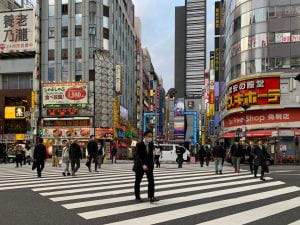April 10, 2020
As in many other places, there is a debate now playing out in Japan that frames restrictions on the movement of people as inherently opposed to the economic interests of the nation. Economic revitalization has been the keystone of the second Abe administration, and Abe emphasized in his April 7 press conference following this declaration of a state of emergency that “The Japanese economy is facing the greatest crisis since the end of World War II.” With this statement, Abe joins the many Global North leaders who have invoked WWII as a template for how their nation ought to face this crisis. He also underlines once more his concern for the economic dimension of this pandemic, a concern which may have caused him to delay recognizing a state of emergency.
We need to shift the terms of the debate of economic strength versus global health in this moment. Part of what might help undo this false binary is to think about how economic metrics like the stock market, GDP, or even the formal economy, more generally often obscure other very important ways we could measure wealth, which might include public health, gender equality, and access to basic needs like shelter and clean water, but not necessarily be limited to these elements.
The day after PM Abe’s declaration of a state of emergency, I was surprised to see many small businesses still open in my neighborhood. I wondered: “Is a shop selling antiques or artificial flowers really an “essential” service?” In terms of public health, probably not. But for that small shop owner, of course their livelihood feels essential.

There has been evidence of transmission of COVID-19 through nightlife venues, which includes sex work establishments. But many in the government have fought against including sex workers in any subsidy program to offset income lost by parents forced to take time off of work to care for children. While the self-employed and employers of parents who cannot work are eligible, Ministry of Health, Labor and Welfare minister Kato Katsunobu stated on April 3 that he didn’t “think it’s appropriate” to include workers of cabaret clubs, host and hostess bars, and soaplands as among those eligible for such funds. This is madness in a society that has constructed such entertainment as part of corporate masculine socialization, and in which this work functions as an important, informal social safety net for women in an economic landscape often marked by deep gendered wage discrimination in so many other contexts.
There is no clean way to tease out how the economic pressures of restrictions on movement and work will hurt people’s livelihoods in a way that many may feel is worse than sickness. However, . It is one thing to facilitate telework from home, something that Japanese corporations have been slow to adopt and which presents its own challenges, but another to address the preexisting situation in which many people don’t have a home from which they can work. When the 24-hour internet cafes are forced to close, those who depend on sleeping in them and using the internet there to find work are more vulnerable than ever to hunger, as well as infection.
<< Previous Next >>
Chelsea Szendi Schieder is a historian of contemporary Japan and an Associate Professor in the Faculty of Economics at Aoyama Gakuin University in Tokyo, Japan. Her book, Co-Ed Revolution: The Female Student in the Japanese New Left, is forthcoming on Duke University Press.
* * *
The Teach311 + COVID-19 Collective began in 2011 as a joint project of the Forum for the History of Science in Asia and the Society for the History of Technology Asia Network and is currently expanded in collaboration with the Max Planck Institute for the History of Science(Artifacts, Action, Knowledge) and Nanyang Technological University-Singapore.
![[Teach311 + COVID-19] Collective](https://blogs.ntu.edu.sg/teach311/files/2020/04/Banner.jpg)